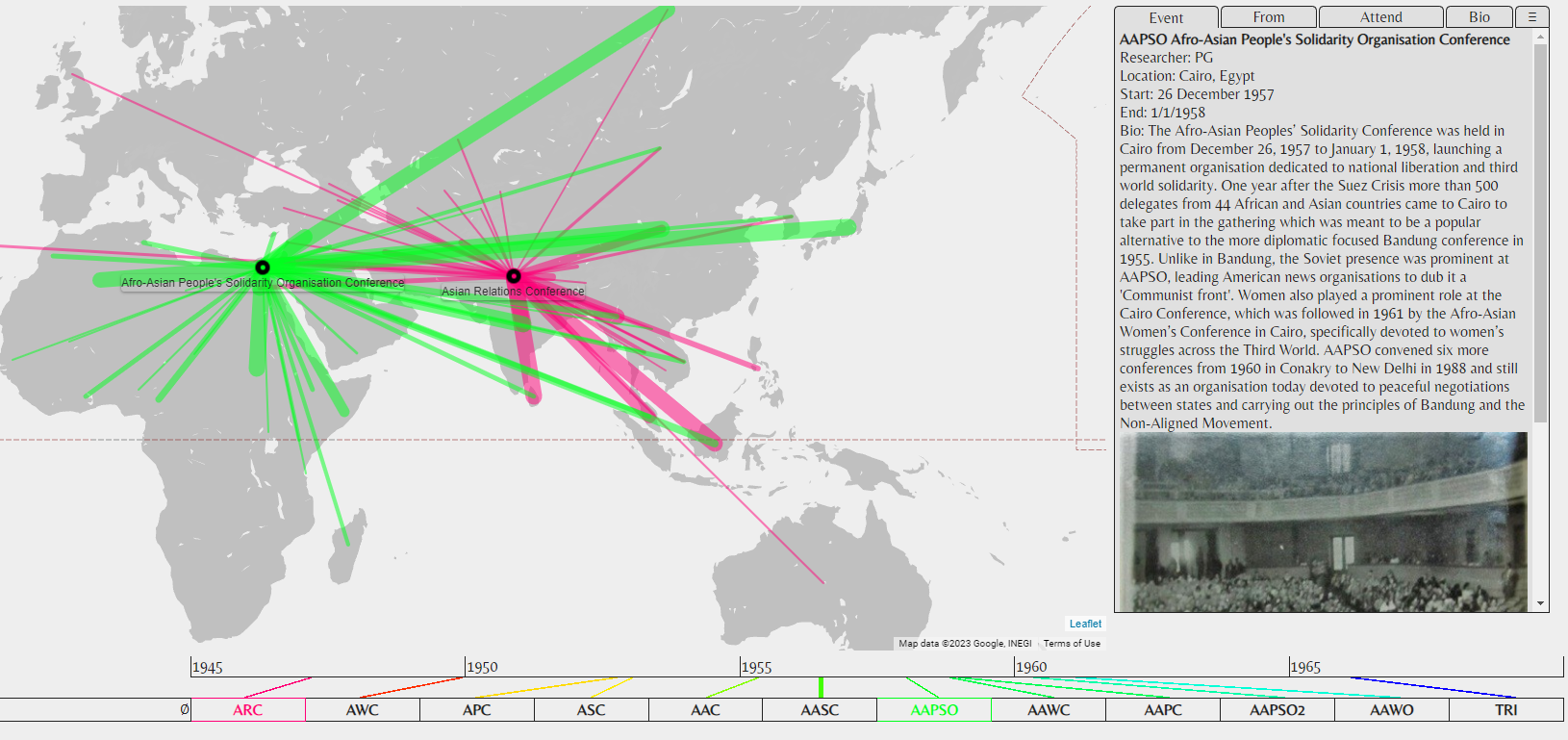Afro-Asian Networks Visualised
How can a database of information of events and movements that brought together Asians and Africans across national borders in the 1950s and 1960s be represented in an innovative visual way?

The Afro-Asian Networks project investigates networks of Asian and African intellectuals, activists, writers, and artists moving within the global context of the early Cold War in the first decades of decolonisation. At the time of this study, this interdisciplinary research network was recently asked to contribute a ‘Manifesto’ to Radical History Review’s call for papers on the Global South. The manifesto called for a radical new way of writing history, and particularly the history of decolonisation, that moves away from the lone-scholar model towards doing history as a collaborative endeavour from the start. From a collaborative research week in the archives to a magazine format blog on medium.com, the network were building up a growing group of researchers working together to compile a database of information of events and movements that brought together Asians and Africans across national borders in the 1950s and 1960s.
What did the project involve?
This project sought to visualise the Afro-Asian Networks database and make it accessible to the wider public, showcasing a transnational history of decolonisation from the point of view of the Global South that moves away from Eurocentric and nationalist narratives. The database showcases global interconnections and promotes an understanding of multiple historical perspectives and points of connection within a shared visual space. The visualisation shows how decolonisation and the Cold War were experienced in different ways in different locales, based on the research of scholars working in various regions and countries.
In visualising this exciting project, the team sought to build a platform that facilitates the co-production of a global public history of decolonisation, inviting Asian and African researchers – from those within higher education institutions to those with a personal interest in researching activist and family history – to contribute data about the Afro-Asian era and the individuals who moved between borders within the era. They sought to profile the work of these Asian and African scholars working on Afro-Asian history – particularly those who may not have an institutional profile page – through their own website and blog, and link to history-themed blogs, magazines, and websites within Asia and Africa as a mode of reconnecting the postcolonial histories of these two continents.
Using the spreadsheet data continuously generated from the Afro-Asian Networks Project, the project created a visual, moving map of conferences, underground meetings, and key events of the Afro-Asian era (eg. the 1953 Asian Relations Conference in Delhi, the 1953 Asian Socialist Conference in Rangoon, the 1955 Afro-Asian Conference in Bandung, the 1957 Afro-Asian
People’s Conference in Cairo, the Afro-Asian Writers Conference in Tashkent in 1957). The researchers sought to show the cities in which these meetings took place, the journeys that activists, intellectuals, and artists took to get there, and the professions of those attending.
The team sought to harmonize their dataset with other databases that have 20th century labour, artist and activist networks at their focus. To do so will allow us to make sure that our work is amendable to similar data-driven research in the future and to increase our abilities to trace networks through multiple social, professional and institutional environments.
Who are the team and what do they bring?
- Sin Lin Lewis (History, University of Bristol) is a historian who specialises in global and transnational history in the twentieth century, and have research interests in urban history, civil society and activist networks, gender, migration, decolonisation, and development in the twentieth century.
- Rachel Leow (History, University of Cambridge) is a historian who’s research continues to develop and discover cultural and intellectual geographies that better fit the complex architecture of Asian societies — particularly the ways in which its own peoples imagined their pasts and futures, and how they have weathered and conceptualized times of revolutionary change and socio-cultural upheaval.
- Carolien Stolte (History, Leiden University) is a historian who’s research focuses on the international history of South Asia from a transregional perspective.
- Tarim (Pervasive Media Studio) is an artist has been involved with number of different installation projects and technology platforms that explore embedding playful technology into the world. He creates Media Playgrounds – installations which people can both play with and build new and different places to play in.
What were the results?
The visualisation of the Afro-Asian Network’s database can be accessed here.

You can read more on the Afro-Asian Networks website and on the Afro-Asian Visions Blog.
The Afro-Asian Networks Visualised project builds on research gathered by a group of scholars as shown in the website above.
Su Lin Lewis and Carolien Stolte co-wrote the paper ‘Other Bandungs: Afro-Asian Internationalisms in the Early Cold War‘.


Project Social Media